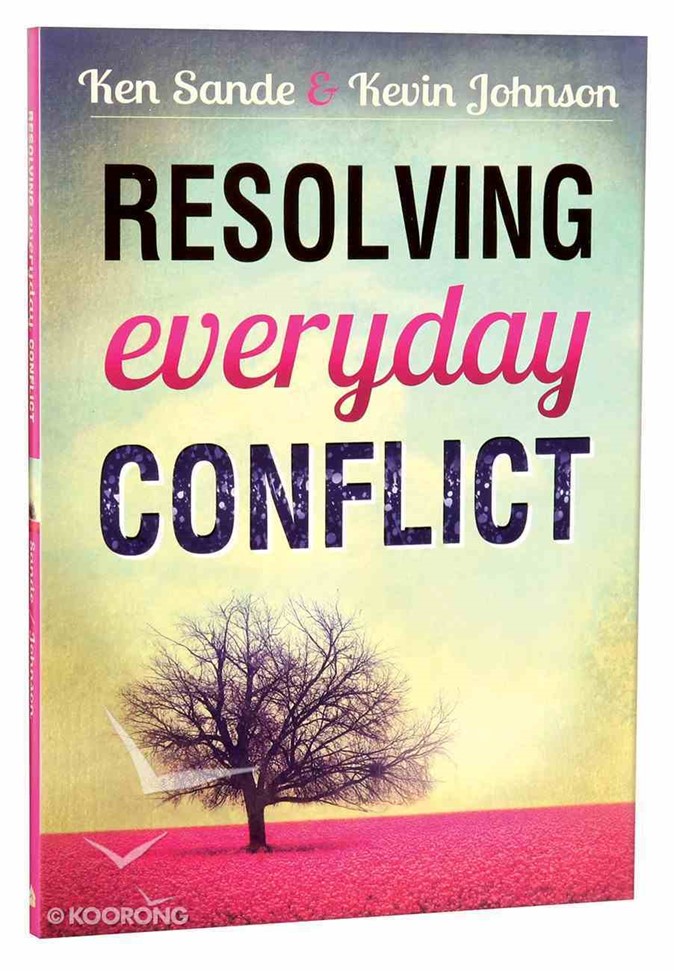Book Review: Resolving Everyday Conflict
<- Back
Resolving Everyday Conflict
Book Author: Ken Sande and Kevin Johnson
Review Author: Cheronne
West Albany Free Reformed Church
Pro Ecclesia Bookshop
Resolving Everyday Conflict
By Ken Sande and Kevin Johnson
2011/128 pages
Conflict. Some avoid it, some fear it, some embrace it, but we all face it. Sande and Johnson have provided us with a short compact guide to resolving conflict in a Biblical way. Even those who avoid conflict wherever possible, will appreciate the gentle, godly way in which these authors approach the topic.
Many readers are probably acquainted with Ken Sande and his book “The Peacemaker.” This small pithy book is much of that wisdom condensed in an easy-to-read summary.
After talking about what conflict is and how EVERYone encounters conflict, he goes on to talk about the cause of conflict, which is very often our own sinful hearts. It often begins when we don’t get what we want (James 4:1-2), which can grow into idolatry. “The world around us doesn’t help us put God at that rightful first place in our lives" (P. 19). However, Biblical responses to conflict can show others that we are Christ’s followers. The point is made that conflict is not always bad: we are aiming for unity, not uniformity and conflict can be used in very positive ways.
The authors show how the hope of the gospel and its transforming power can change lives already here and now, including the way we resolve conflict. “When I understand and experience what God has done for me, my response moves from ‘I should do that’ to ‘I can do that,’ and ultimately to ‘I want to do that.’ ” (p. 33). They demonstrate that using biblical principles means we avoid becoming peace-fakers (escaping from conflict or denying it) or peace-breakers (casting blame and attacking) but instead peace-makers (dealing with it in a Biblical way).
The next section goes through what Ken Sande has dubbed the four Gs. I will briefly summarize each one:
Go Higher: Ask the question “How can I glorify God in this situation?” This may mean overlooking an offense. If this is not possible this first principle will guide all the further steps you take.
Get Real: Own your part in a conflict. I beg God to help me see the log in my own eye. Start with me and where I may have contributed to the conflict. “If I’m only 2 percent responsible for a conflict I’m 100 percent responsible for that 2 percent” (p. 62). Confess honestly. A good confession is harder than you think!
I appreciated the 7 parts of a good confession the authors suggested:
- Make the confession to everyone involved (“Your confession should reach as far as your offense”).
- Avoid ‘if’, ‘but’, and ‘maybe'. Make it an unqualified confession.
- Make your admissions specific.
- Acknowledge the hurt that you have caused.
- Accept the consequences: make restitution, repair any harm.
- Alter your behaviour: commit to not repeating the sin.
- Ask for forgiveness (and allow time).
Gently Engage: Help others own their part of a conflict. This chapter was based on Galatians 6:1 “Restore him gently.” The point is also made that even when someone else has something against you, God still expects you to take the first step in seeking peace (Matt 5).
Get Together: Giving forgiveness and arriving at a reasonable solution. Again, the authors point to God’s incredible forgiveness offered to us and how that drives our forgiveness for another. While at times forgiveness can be very difficult and even costly, it is ultimately detrimental to us if we don’t forgive. “Unforgiveness is the poison we drink, hoping others will die.” (p. 90)
The authors acknowledge there are times reconciliation is not possible. However, our attitude needs to be one of readiness to forgive, regardless of whether the offender repents. They also give suggestions for what to do in cases where the other party does not want to reconcile.
This book could be used as a type of handbook when you need to remind yourself of the steps of Biblical peacemaking. The typesetting and layout make it more readable than the longer book by Sande, “The Peacemaker.” Filled with Bible texts and references to Scripture, with the occasional real-life example, it is a worthwhile book to have on the shelf. I have only touched on the surface of all the gold nuggets to be found in this book – so pick up a copy and give it a read!
Cheronne van der Heide, West Albany

